|
|
consultationCollege meets with Deaf and hard-of-hearing members
About 30 members attended the session, which was held at the request of the Deaf and hard-of-hearing community. Richard Lewko, Director of Corporate and Council Services, reviewed services for all members. He indicated that members who are Deaf or hard of hearing can take advantage of the College’s TTY access by calling 416-961-6331 or use the Bell relay service, in which a specially trained operator reads a message typed by the TDD/TTY user to the hearing person and relays back a reply. Recent experience has shown that most members who are Deaf or hard of hearing choose to communicate with the College using e-mail. Questions from participants centred on whether or not members who are Deaf and hard of hearing can lodge a complaint if their use of sign language with Deaf students is being restricted by their employer. Director of Investigations and Hearings Joe Jamieson explained the process for lodging a complaint and how it is handled by the College.
Jamieson indicated that the complaint process might be appropriate only if an Individual Education Plan for a student who is Deaf or hard of hearing is not being followed. Atkinson ScholarMusic awardToronto music teacher wins $10,000 national awardToronto music teacher Alex Voros is packing his bags this month for a free trip to Vancouver for the March 26 to 29 Juno awards. Voros, a Chaminade College School faculty member, is the 2008 winner of the fourth annual MusiCounts Teacher of the Year Award. MusiCounts, a charitable organization dedicated to promoting music education across the country, is associated with the Canadian Academy of Recording Artists and Sciences. “This is the high point of a 30-year career,” says Voros. “It’s like a lifetime achievement award, but I’m accepting it on behalf of the music educators’ fraternity who work very, very hard. These are tough times for music and the arts.” Through music, Voros creates a “safe haven for many at-risk youth to grow creatively,” says Chaminade principal Michael Wallace, who nominated Voros for the award. Voros agrees. “Amazing things happen when you study music. Our music students have only a one per cent dropout rate.” One doesn’t have to be a prodigy to be accepted into one of Voros’s music groups, which range from Dixieland to liturgical. “I don’t hold auditions, but I do ask that everyone work hard and believe in themselves.” Clearly, Voros’s enthusiasm rubs off on his students. More than 200 of the school’s 900 students are in one of his ensembles, with more on a waiting list. His bands and other groups have won major Canadian and North American competitions. “My kids can play,” he says. Voros credits Ronald Chandler, his Grade 11 music teacher, for putting him on a music career path. “I’m so grateful that he took me aside and encouraged me to continue with my music,” says Voros, who has played professionally since he was 17 and is now a regular trombonist in the Swing Shift Big Band. Besides the all-expenses-paid trip to the Junos, Voros received $10,000 and a handcrafted glass trophy. In addition, Chaminade College School, part of the Toronto Catholic DSB, received $10,000 for its music program, money that is being spent to diversify the school’s music library. Only teachers at schools that have received a MusiCounts Band Aid grant are eligible for the Teacher of the Year Award. To date, MusiCounts has distributed $3 million in Band Aid money to some 270 schools across the country. For more information or to make a nomination, visit www.musicounts.ca. Talking up PALThree days that could change your life as a teacherThe PÉdagogie culturelle team is organizing a meeting/dialogue for April 21 to 23 at the Centurion Conference Centre in Ottawa. The team of Ontario educators is engaged with several education partners to provide a model and methods that can assist in constructing cultural identity in a minority context. The organization serves teachers who want to support their students’ development and have called for specific ideas they can incorporate into the curriculum. The event is the fruition of five years of initiatives in support of the Ontario Ministry of Education’s initiative, Politique aménagement linguistique (PAL) or language planning policy. Pédagogie culturelle team members come from all over the province and the event is an opportunity to network and gather new ideas that will enrich students’ learning and their identity-construction experience. The Pédagogie culturelle partners are FESFO (Féderation de la jeunesse franco-ontarienne), AEFO (Association des enseignantes et des enseignants franco-ontariens) and CLÉ (Centre canadien de leadership en évaluation). The project also receives funding under the Canada-Ontario Agreement between the Department of Canadian Heritage and the Government of Ontario. For more information and to register, visit www.pedagogieculturelle.ca or call 1-866-860-9555. College membersMeet your colleagues
Youssouph Sané teaches Grade 6 at École Gabrielle-Roy in Toronto. He has been a member of the College since 1993.
InternationalMandela seeks children’s freedom from poverty
A week-long, school-based program, from April 27 to May 1, organized by the Nelson Mandela Children’s Fund (Canada), is an annual initiative that encourages students to learn about Mandela’s life, the rich culture and history of South Africa and the challenges facing its youth. The program gives students the chance to learn through participation and to experience the principle of global citizenship. The winner of a Canadian national poster contest for kindergarten to Grade 12 students will be announced at the launch of the week. Copies of the winning poster will be distributed to thousands of schools across Canada, will be sent to the Children’s Fund office in South Africa and will appear on the Spirit of Mandela web site. Many schools will participate in the week’s activities – helping to raise awareness and funds. Comprehensive curriculum guides and resource materials are available online. For more information or resource materials, visit spiritofmandela.ca and mandela-children.ca. Aboriginal TeachingvisitorsDelegations regularly visit the College to share and gather information on a range of education issues, including accreditation, qualifications and standards of practice.
Writing awardsAboriginal youth recognized for creative writingAboriginal youths will have an opportunity to showcase their writing abilities through participation in the James Bartleman Aboriginal Youth Creative Writing Award. The award recognizes up to six Ontario Aboriginal students for their creative writing talent. Creative pieces may include, but are not limited to, short stories, poems, essays, plays and songs, and must be original works created by the students. The 2008 winning entries included writings about nature, family relationships and misconceptions about Aboriginal people. The Government of Ontario created the award to commemorate the Honourable James K. Bartleman’s 2002–07 term as Ontario’s Lieutenant Governor. It was set up as a legacy to Bartleman’s far-reaching vision and his efforts in promoting literacy among Aboriginal youth. Winners each receive $2,500 and a trip to the Canadian Aboriginal Festival in Toronto in November. Self-identified Aboriginal students attending school anywhere in Ontario are eligible to enter in one of two age categories: junior (up to 12 years old) and senior (13 to 18 years old). The deadline is May 31, 2009. For more information visit www.ontario.ca, call 416-314-7526 or e-mail OntarioHonoursAndAwards@ontario.ca. Self-Regulation
InternationalOntario teacher establishes school in MadagascarTeachers seeking a life-changing volunteer experience need look no further than … Madagascar. “I’ve never been so happy in my life,” says veteran elementary school teacher Kathy Lucking, who returned to Canada in January after spending six months on the island nation off Africa’s east coast. “This is a place where one can make a huge difference.” Lucking is a learning resource coach with Reading Recovery experience at Maxville Public School in Maxville (population 850) in eastern Ontario. Backed by remarkable financial support from her community and family, Lucking last fall supervised the establishment of a new school in a rural part of the former French colony. Maxville PS granted her a six-month leave to oversee construction of the school and to teach in the first three months of the school year. “Education is free in Madagascar,” explains Lucking, “but these children can’t afford the shoes, notebooks and pencils, to say nothing of uniforms. We are also working with the community to improve agriculture so the kids are well fed every day. “When I arrived, the children were listless. But after two months of receiving regular meals at the school and going to classes, they’re energetic and enthusiastic.”
Back in Canada, she set out to raise more money to establish the school in the impoverished country. In July, she went back to Madagascar after amassing a further $20,000 from in and around Maxville. That was just enough to erect the school that opened its doors last October. It is called Sekoly Lovasoa, which means a school that transmits to children what is needed to make a positive change in the world. Fundraising continues to pay the $308 a month in salaries for the school’s director, two teachers, two assistants and security guard, all locals. The three-classroom facility has some 65 students. Providing the kids with a noon meal costs a further $520 monthly. “Some of these children are as old as nine and had never attended school before,” says Lucking. “This is probably their last best chance to receive an education – and the community is so grateful.” Next steps, depending on future fundraising, are more classrooms and a community library. And for Lucking, to return as soon as possible. Teachers who volunteer their services will receive free room and board at new apartments above the school. While they are expected to pay their airfare and won’t receive a salary, the payback will be “the experience of a lifetime.” For further information or to make a donation, visit www.madagascarschoolproject.com. Teaching AwardsNominate a colleaguethe Ontario Teachers’ Federation and Ontario Teachers Insurance Plan present teaching awards in three categories: elementary, secondary and beginning teacher. Make nominations at www.teachingawards.ca until March 31. The Royal Canadian Geographical Society’s Geographic Literacy Award honours educators in this field. Nominate a colleague at www.rcgs.org by June 1. Canada Mortgage and Housing Corporation honours secondary and postsecondary educators who are integrating sustainable housing and community-development concepts into their curriculum. Visit www.cmhc.ca until May 31. Opportunities For YouthHundreds take advantage of initiative promoting postsecondary enrolmentA burgeoning program aimed at encouraging marginalized youth to pursue postsecondary opportunities offers a variety of activities, including educational “house calls.” Launched last April, You Can Go is a joint venture of the YMCA and the Canada
“Most of these kids have never set foot on a university or college campus,” says Adela Colhon, National Programs Manager, Canada Post-Secondary Access Partnership for the Greater Toronto YMCA. “We’re also happy to visit high schools and offer our workshops on site. We can customize the session to meet a school’s request, such as how to finance your postsecondary education.” You Can Go is designed for high school students from Aboriginal, low-income and recent immigrant families, most of whose members have not received a postsecondary education. While the emphasis is on breaking down social barriers that are obstacles to attending university or college, other opportunities such as vocational schools and apprenticeships are also discussed. The problem is acute. According to the Millennium Foundation, the dropout rate in some of Toronto’s poorer neighbourhoods is more than 50 per cent. One myth that is keeping some kids from a postsecondary education is that it is too expensive. A Millennium Foundation survey found that some 60 per cent of high school students believe that university tuition is double the actual cost. In You Can Go’s first six months, nearly 600 young people attended one of the numerous two-hour workshops offered at three Greater Toronto YMCA locations: 42 Charles Street East in Toronto (416-928-6690), 16655 Yonge Street, Unit 3, in Newmarket (905-773-7141) and 183 Simcoe Avenue, Unit 4, in Keswick (905-989-9622). Nearly 500 students, some as young as 13, participated in individual counselling sessions. “With numbers like that, we know we are making a difference,” says Colhon. You Can Go is a national program offering services at nine locations, from Québec City to Vancouver. Four more branches, including one in Sudbury, are planned for 2009. For more information visit www.youcango.ca or www.onyva.ca or contact Adela Colhon or at 416-928-3362, ext 4140. Student supportFormer PM, accountants team up to help Aboriginal studentsFormer Prime Minister Paul Martin and accounting firms affiliated with the Canadian Institute of Chartered Accountants want to help Aboriginal high school students graduate and pursue careers in accounting. The Martin Aboriginal Initiative, created as a charitable foundation, aims to “support various educational opportunities that will enable Aboriginal Canadians to have access to the opportunities they need to succeed.” Accounting firms KPMG and BDO Dunwoody will mentor up to nine Ontario students who have an interest and aptitude in accounting, in Brantford and Fort Frances. Facilitators hope to expand this pilot project across Canada and into other professions. Get involvedInnovative TV/Web initiativeTVO, in partnership with Q Media Solutions, recently launched a social networking site at getinvolved.ca, described as Facebook meets Craigslist meets Lavalife for people who want to change the world.
“With many students across Ontario seeking volunteer opportunities, the site presents an exciting social-networking community where students, teachers and their parents can connect directly with not-for-profits, charities and community organizations,” says TVO’s Chief Executive Officer Lisa de Wilde. The documentaries direct viewers to getinvolved.ca, where visitors can offer or ask for help. Interested volunteers can register to be matched with organizations that need help in a variety of areas, including youth and education, the environment and international development. The site features an “act” button, teasers on upcoming documentaries and links to charity events. “Everything we do at TVO is about empowering people in Ontario to become more active and engaged citizens,” says de Wilde. “With creative partnerships like getinvolved.ca, we increase our impact in the borderless world of digital media.” Notable DatesMarchApril
MayJuneFor other international observances visit www.un.org, or try www.unac.org |













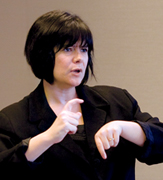 Members of the profession
Members of the profession
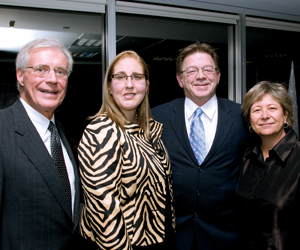
 Your 2009 membership package
Your 2009 membership package
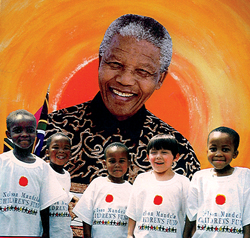

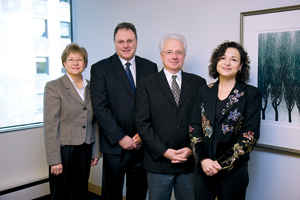

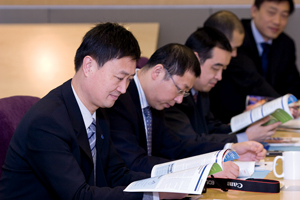

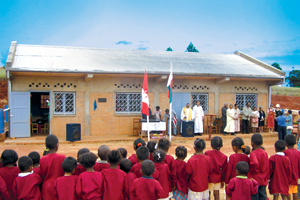 Lucking, who has taught for 20 years, had been looking for an opportunity
to work in the developing world for some time when she met with an Ottawa-area
woman who had established an orphanage in Madagascar’s capital city of
Antananarivo. Inspired, Lucking worked at the orphanage for a month in the
summer of 2007 and returned to the island that Christmas break with $5,000
to look for land on which to build an English-language school. On the day before
her return flight, an Anglican parish donated a suitable parcel.
Lucking, who has taught for 20 years, had been looking for an opportunity
to work in the developing world for some time when she met with an Ottawa-area
woman who had established an orphanage in Madagascar’s capital city of
Antananarivo. Inspired, Lucking worked at the orphanage for a month in the
summer of 2007 and returned to the island that Christmas break with $5,000
to look for land on which to build an English-language school. On the day before
her return flight, an Anglican parish donated a suitable parcel.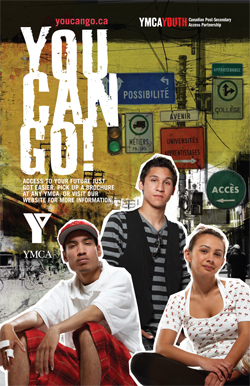 Millennium Scholarship Foundation with partners and supporters from the private
sector, other community organizations and postsecondary institutions. From
three locations in Greater Toronto, the initiative now offers one-on-one counselling,
group seminars and field trips to postsecondary institutions.
Millennium Scholarship Foundation with partners and supporters from the private
sector, other community organizations and postsecondary institutions. From
three locations in Greater Toronto, the initiative now offers one-on-one counselling,
group seminars and field trips to postsecondary institutions. This initiative provides a platform for community engagement and is promoted
through TVO’s daily prime-time documentary series Get Involved, which
tackles current issues and covers events that give people hope for the future.
This initiative provides a platform for community engagement and is promoted
through TVO’s daily prime-time documentary series Get Involved, which
tackles current issues and covers events that give people hope for the future.